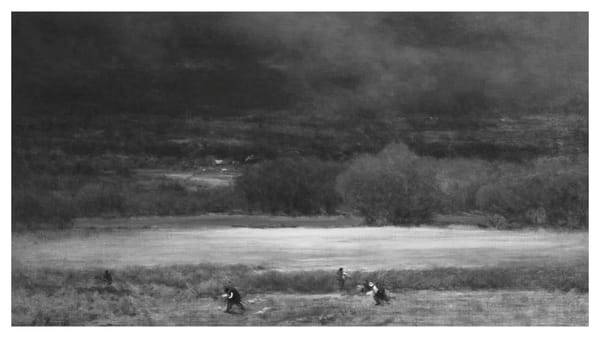Our Becoming Prophetic
God is calling His people to a deeper, prophetic life, hearing His voice, and reflecting His presence, preparing for a greater outpouring in these last days.
Sermon Details
- Title: Our Becoming Prophetic
- Speaker: Wade E. Taylor
- Date: November 6, 2004
Introduction: Strategic Context and Timing
In November 2004, at a pivotal moment in American history, Wade E. Taylor delivered a prophetic message that would prove significant not only for its content but for its timing and location. Speaking from a church in the Washington D.C. area, Taylor presented this teaching against the backdrop of a divine vision - a spiritual bridge extending from the church directly into the Capitol building. This positioning reflected both immediate purpose and long-term prophetic strategy, particularly concerning spiritual influence in governmental spheres.
Taylor's authority to address such matters stems from a transformative throne room experience in 1959, where he received a specific commission for "the preparation of a people for the end-time purpose of the Lord." This divine appointment, followed by more than four decades of ministry, provides the foundation for understanding both current spiritual opportunity and future prophetic purpose.
The timing of this message carries particular weight, emerging just as the nation had made significant moral decisions that, according to Taylor, preserved divine protection over America. He specifically noted the unanimous rejection of certain legislative measures as evidence that America's moral fiber remained sufficiently intact to warrant continued divine favor and protection. This understanding of timing and divine response provides crucial context for the broader message about prophetic preparation and corporate spiritual development.
The Heart of the Message
At the core of this teaching lies a profound spiritual paradox that Taylor terms "dissatisfied satisfaction" - a state of being deeply grateful for current spiritual experience while maintaining an insatiable hunger for greater depths in God. Taylor demonstrates this principle through personal testimony, particularly in his revolutionary approach to evaluating ministry. Rather than measuring success through conventional metrics such as attendance or apparent impact, he judges each gathering by the tangible presence of divine life.
"I grade each meeting by the level of the presence of the Lord that's present in the meeting," Taylor explains, establishing a fundamental principle that challenges traditional ministry evaluation. This approach recognizes that transformation occurs not through increased activity or improved methodology, but through enhanced capacity for divine presence. As he notes, "The word does not say we are changed from sermon to sermon," emphasizing that true transformation stems from divine presence rather than human effort.
The Progressive Nature of Prophetic Development
The theological framework Taylor establishes reveals prophetic development as a progressive journey through distinct levels of spiritual function. Beginning with Psalm 119:25, "My soul cleaveth unto the dust: quicken thou me according to thy word," he identifies the fundamental necessity of divine quickening as the foundation for all prophetic function. This initial quickening represents the crucial lifting from natural to spiritual perception.
Taylor illuminates this progression through his own journey, sharing a particularly poignant experience from 1957. As a young believer, he found himself in a small church, desperately pleading with God for prophetic ability. When the Lord finally gave him something to speak, he faced the common struggle between divine prompting and human hesitation. His failure to speak in that moment, followed by repentance before his pastor, became a foundational lesson in prophetic development - the necessity of both receiving and releasing divine utterance.
The journey continues through what Taylor identifies as gift operation, drawing from 1 Corinthians 14. At this level, believers experience specific manifestations of prophetic gifts, learning to yield to divine promptings while maintaining proper motive and timing. This operation, while valuable, remains limited to specific moments and manifestations rather than becoming a consistent life expression.
A further dimension emerges in the prophetic office, established in 1 Corinthians 12:28. This represents not merely increased spiritual activity but official function within church structure, carrying greater responsibility and requiring proven character. Taylor emphasizes that while many may operate in prophetic gifts, the office calling remains limited to those specifically placed by God for this purpose.
The highest level of prophetic function, which Taylor terms "the spirit of prophecy" based on Revelation 19:10, transcends both gift operation and official position. This level represents not merely speaking prophetic words but becoming a living expression of Christ's testimony. As Taylor explains through Christ's own words, "If you've seen me, you've seen the Father" - not a statement about divine nature but about perfect alignment with divine purpose and expression.
Warfare Through Worship
Perhaps one of Taylor's most significant contributions lies in his understanding of spiritual warfare through worship. He presents a revolutionary perspective on dealing with spiritual opposition, particularly in relation to principalities and powers. Rather than addressing these forces through conventional spiritual warfare methods, Taylor introduces worship as the primary means of displacing spiritual opposition.
This understanding emerges from both scriptural study and practical experience. Taylor shares a remarkable testimony of two ministers traveling between Toronto and London, Ontario, who witnessed a prophetic vision of principalities writhing in pain due to corporate worship. This experience demonstrates worship's power beyond mere preparation for ministry - it becomes a strategic weapon in spiritual warfare.
Using the analogy of flying above storm clouds into brilliant sunshine, Taylor illustrates the reality of spiritual atmosphere and its effect on human experience. Just as natural clouds can obscure the sun's constant light, spiritual opposition can hinder the experience of God's presence and purpose. However, through intentional worship and spiritual practice, believers can create what Taylor terms "open heaven" experiences - areas where divine presence manifests despite surrounding spiritual climate.
The Corporate Dimension
Taylor's teaching reaches its zenith in addressing the corporate expression of prophetic life. Drawing from Revelation's vision of "the voice of many waters," he presents a picture of the church moving beyond individual prophetic expressions into corporate prophetic function. This corporate dimension manifests not merely as many individuals prophesying but as a body so aligned with divine purpose that it speaks with one voice.
Creating Spiritual Atmosphere
The concept of spiritual atmosphere emerges as a crucial element in Taylor's teaching, drawing from the Genesis account of God walking with Adam in the cool of the day. This biblical pattern establishes that even in perfect conditions, God chose specific times and environments for heightened communion. Taylor develops this understanding to show that spiritual atmosphere, far from being incidental, must be intentionally cultivated and maintained.
This cultivation begins, according to Taylor, well before any formal gathering. He emphasizes the importance of early arrival and preparation, not as a matter of mere punctuality but as essential participation in creating spiritual environment. The fellowship hall, he notes, provides space for necessary social interaction, allowing the sanctuary to maintain its focus as a place of divine encounter. Such practical wisdom reveals Taylor's deep understanding of how natural activities affect spiritual atmosphere.
The principle of "deep calling unto deep" takes on fresh significance in this context. Taylor explains this not merely as spiritual intensity but as the expression of God's own desire for communion finding response in human hearts. This divine-human interaction creates an atmosphere where spiritual revelation and transformation naturally occur. The very design and structure of their gathering place, Taylor notes, has been crafted to be conducive to worship, demonstrating how physical environment can support spiritual purpose.
The Nature of Spiritual Authority
Taylor presents a unique understanding of spiritual authority, particularly in dealing with principalities and powers. He carefully distinguishes between different levels of spiritual opposition, explaining that while demons require direct confrontation and expulsion, principalities face displacement through worship. This distinction proves crucial for effective spiritual warfare, preventing believers from misapplying spiritual principles.
The concept of displacement through worship finds illustration in Taylor's understanding of Satan's original position. Drawing from Ezekiel's description of Satan as a worship leader who "walked among the stones of fire," Taylor explains how genuine worship now displaces the enemy from his former realm of authority. This understanding transforms worship from mere religious activity into strategic spiritual engagement.
Through personal testimony and biblical exposition, Taylor demonstrates how this authority operates in practical experience. His own practice of praying for "open heaven" reveals how individual believers can participate in changing spiritual atmosphere. The testimony of Finney's ministry, where his mere presence in a city would trigger spontaneous repentance, illustrates the potential impact of those who learn to carry divine presence.
Strategic Timing and Positioning
The significance of Taylor's message gains additional weight through his understanding of divine timing and strategic positioning. His specific calling to the Washington D.C. area reflects more than geographical preference; it represents divine positioning for kingdom purpose. The vision of a spiritual bridge connecting church to Capitol reveals God's intention to influence governmental spheres through prepared vessels.
This positioning coincides with what Taylor identifies as a crucial moment in national history. The preservation of moral foundations through recent legislative decisions, he explains, has created an extended window of opportunity for divine purpose. This understanding of timing moves beyond mere observation to strategic engagement with divine purpose in governmental spheres.
The Path to Prophetic Life
The journey toward genuine prophetic function, Taylor explains, requires fundamental transformation of personal identity and motivation. He draws particular attention to Revelation 3:17's warning about self-sufficiency, identifying the declaration "I am" as a core hindrance to spiritual development. The solution, he teaches, lies not in acquiring more gifts or knowledge, but in the crucifixion of self-initiative and independent action.
This death to self creates space for Christ's life to find expression. Taylor illustrates this through Jesus's own testimony: "The words that I speak, they are spirit and life." This quality of communication emerged not from refined technique or increased ability, but from perfect submission to and alignment with the Father's will. The same principle applies to prophetic development - the goal is not better prophetic words but becoming a vessel through which Christ's life flows freely.
The contrast between structured development and spiritual transformation finds clarity in Taylor's exposition of Jesus's dialogue with Nicodemus. While natural processes, like physical birth, follow predictable patterns, spiritual development operates like wind - sovereign, unpredictable, yet unmistakably real. This understanding liberates believers from rigid formulas while maintaining reverence for divine sovereignty in spiritual development.
Corporate Prophetic Expression
The ultimate goal of prophetic development, Taylor reveals, extends far beyond individual ministry. Drawing from Revelation 19's vision of a great multitude speaking as one voice, he presents the emergence of a corporate prophetic expression that transcends individual gifting. This corporate dimension requires both individual maturity and collective harmony, producing what Taylor terms "the sound of many waters."
This corporate expression operates at a higher level than merely many individuals prophesying. It represents a body so aligned with divine purpose and so submitted to Christ's headship that it naturally speaks what heaven speaks. Taylor emphasizes that achieving this level of corporate function requires each member to develop genuine prophetic sensitivity. The goal is not uniform prophetic expression but harmonious participation in divine purpose.
Taylor connects this corporate development to end-time purpose through his understanding of "the seven spirits of God." These represent not separate spirits but different aspects of Christ's ministry expressing through His body. This higher order of function will enable the corporate body to manifest Christ's ministry as fully as He did in His individual body during His earthly ministry.
Contemporary Application
The practical implementation of these truths begins with personal preparation but always maintains focus on corporate purpose. Taylor emphasizes the cultivation of spiritual sensitivity through regular prayer, particularly in tongues, which bypasses human understanding to access divine mysteries. This personal development, however, must occur within the context of corporate participation and submission to divine headship.
The creation and maintenance of spiritual atmosphere requires both individual and corporate responsibility. Taylor advocates arriving early for gatherings not merely as good practice but as essential participation in establishing spiritual environment. This practical step, combined with engaged worship and focused attention, contributes to an atmosphere where divine presence can manifest freely.
The strategic timing of current spiritual movements adds urgency to this development. Taylor identifies the present period as a crucial window of opportunity, particularly in relation to governmental spheres. The preservation of moral foundations through recent legislative decisions has, he explains, created extended opportunity for divine purpose. This understanding calls believers to intentional preparation and positioning for increased spiritual authority.
Conclusion
Taylor's teaching provides comprehensive understanding of prophetic development while maintaining focus on practical implementation. The message bridges personal devotion and corporate destiny, individual preparation and strategic timing. Its delivery in Washington D.C. connects individual spiritual development to broader kingdom purposes and end-time divine intentions.
The vision extends beyond enhanced individual ministry to genuine corporate expression, beyond occasional manifestation to consistent life expression, and beyond current experience to kingdom purpose. It provides both inspiration and practical guidance for those seeking to participate in this higher dimension of spiritual function while maintaining proper motives and character development.
This teaching stands as a crucial guide for the development of genuine prophetic function in both individual believers and the corporate body. Its principles, when properly applied, lead not merely to increased prophetic activity but to the emergence of a people through whom Christ can fully manifest His life and purpose in the earth.
Study Questions
- How does the concept of "dissatisfied satisfaction" contribute to spiritual growth?
- Explain the difference between programmed religious activity and genuine spiritual operation.
- What role does spiritual atmosphere play in prophetic development?
- How does corporate purpose relate to individual prophetic development?
- What distinguishes the spirit of prophecy from prophetic gifting?
- How can believers contribute to creating and maintaining spiritual atmosphere?
- What is the relationship between divine presence and spiritual transformation?
- How does strategic timing relate to prophetic function?
Scripture References
- 2 Corinthians 4:12
- John 6:63
- John 3:8
- Revelation 3:20
- Psalm 42:7
- Genesis 3:8
- Matthew 18:20
- Isaiah 60:1
- Revelation 19:10
- 1 Corinthians 14:3, 31
- 1 Corinthians 12:31




